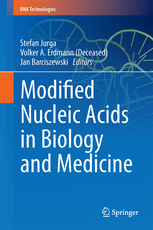This volume is comprised of 18 chapters, covering various aspects of DNA modification and RNA modified bases. It also discusses in detail circular RNA, therapeutic oligonucleotides and their different properties.
The chemical nature of DNA, RNA, protein and lipids makes these macromolecules easily modifiable, but they are also susceptible to damage from both endogenous and exogenous agents. Alkylation and oxidation show a potential to disrupt the cellular redox equilibrium and cause cellular damage leading to inflammation and even chronic disease. Furthermore, DNA damage can drive mutagenesis and the resulting DNA sequence changes can induce carcinogenesis and cancer progression.
Modified nucleosides can occur as a result of oxidative DNA damage and RNA turnover, and are used as markers for various diseases. To function properly some RNA needs to be chemically modified post-transcriptionally. Dysregulation of the RNA-modification pattern or of the levels of the enzymes that catalyze these modifications alters RNA functionality and can result in complex phenotypes, likely due to defects in protein translation. While modifications are best characterized in noncoding ribonucleic acids like tRNA and rRNA, coding mRNAs have also been found to contain modified nucleosides.
This book is a valuable resource, not only for graduate students but also researchers in the fields of molecular medicine and molecular biology.

